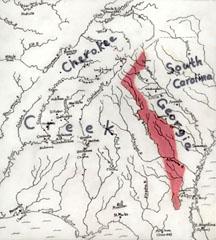The Oconee War
Georgia's Push Into The Hunting Lands Of The Creeks Causes Conflict (Part One)
The Oconee River basin - with the future site of Athens at its upper end - was the beloved and essential hunting ground of the Creek people. In the period between the end of the Revolution and the formation of the United States of America, Georgia, was a part of the loose national government under the Articles of Confederation. It was a frontier state growing north and west from the coast as new settlers poured in after the war. In this series writer Steven Scurry traces the conflict between the land-hungry Georgians and the Creek nation.
Gathering Storm
Georgia's desperately won independence came with a price after the American Revolution: a frightened citizenry, displaced and homeless war refugees, and a shattered economy. New state officials faced armed and war-tempered veterans impatient to get the lands promised them for their martial services. These ominous pressures moved state leaders to cast land-hungry eyes west across the Oconee River.

Photo Credit: Steven Scurry
Desire for Oconee River lands had played a role in the colonial government's downfall. Even before the Revolution, Georgia's land lust had largely alienated the confederated tribal towns of the "Creek nation" who held the Oconee lands dear as a hunting preserve and a buffer between their towns and the white settlers.
British officials had played on this alienation to encourage a Creek-British alliance in opposition to the rebelling Georgians during the Revolutionary War. That war had only magnified the friction over the Oconee lands, and Georgia was now determined to get them by whatever means.
Reporting to the state's Executive Council in the summer of 1783, Georgia Governor Lyman Hall stated that Creek leadership had "utterly declined" to part with Oconee land. He cited recent incidents of citizen aggression on visiting Creek peace delegates as well as the ongoing incursions into Creek country. Governor Hall warned, "… that unless some conciliatory plan is adopted, we shall soon be precipitated into a war, which will greatly distress if not ruin the present settlers of this state."
New Georgia settlers were frequently called "Virginians" by the Creeks, citing their country (state) of origin. But use of the term gained currency as an insult among the Creeks. To be called a "Virginian" was to be associated with greed, aggression and incivility.
Infamous Treaty
Instead of pursuing the conciliatory policy strongly recommended by Governor Hall, upstate leaders in Augusta took an aggressive tack with a smaller, more pliable Creek trade delegation. Facilitated by the incorrigible Elijah Clarke (for whom Clarke County was named), a re-proposed treaty made peace and trade conditional on a Creek land cession. The Creek delegates represented only two confederated towns (neutral during the Revolution) and for these towns held authority to confirm peace and restore the war-interrupted trade. The proposal became a demand on the surprised and reluctant chiefs, and while they pointed out their obvious inability to represent all interested Creek towns in matters as grave and hazardous as land transfers, the Georgians were compelling. They wanted Oconee land and without it they would deny a regular peace with the Creeks. Such was the pretense of these rogue treaty-makers that their "proposal" included a cession of land in the upper Savannah River basin previously ceded to South Carolina by Cherokee leaders.
A three-day detention in Augusta, assisted by that ubiquitous lubricant of treaty making, rum, ended when the homesick town chiefs "stained the Augusta Treaty with quill marks."
The delegates, in a more collected frame of mind, subsequently reminded Georgia leaders of their conditions for taking the Augusta "talks." Tallassee King insisted that the proposed cession would not extend west of the Oconee's "first water" (the north fork), while Nea Mico of Kasitah, preserved his town's hunting rights to the area, at least until homes were built. For these men, the fulcrum of the Augusta talks was trade, pushed by their towns' growing frustration over the lack of it from Georgia. As for land, they both urged the necessity of a sustained Georgia lobby in the form of an agent sent into the nation to promote the treaty for a general confirmation.
While Georgia leaders usually clung to the exclusive working of a treaty's written form, the Creeks tended to synthesize all official talks into an understanding of new arrangements and relationships. For Creek leaders, these meetings were not simply matters of ink-stained papers in coded language, but, more significantly, symbolic exchanges of gifts and tokens (decorated belts, prized feathers and pelts) meant to fix the speeches in memory. Held during a talk, these tokens, when offered, obligated the recipient to the conditions, maintenance and remembrance of the talk. A sad refrain, too often heard among the Creeks, was that Georgia leaders had thrown their talks away.
Rebuffed by other interested Creek towns, Georgia officials broke wise and long established protocol in their Creek diplomacy to endow the Augusta Treaty marks with an authority representative of the whole Creek leadership and society. Back in the nation, a very sober council of over 30 towns excoriated Nea Mico and Tallassee King for their dealings with the land-hungry Georgians. The council sent the state another rejection of the proposed cession and pointed out that the men were clearly not invested to cede Creek land. The council strongly implied that conflict in this matter was the state's to avoid or invite. Lyman Hall's warning was prescient.
Oconee Lands
An early 18th Century Creek war with South Carolina, ignited by unscrupulous traders and suffered by Charlestown citizens, ended with the relocation of several Creek towns. Afterward, the Oconee basin served as a buffer between the expanding tribal towns centered along the Chattahoochee River to the west and the fickle English settlements over the Savannah River to the east. By mid-century the Oconee themselves had generally left the basin, establishing settlements in the Florida peninsula and later becoming a nucleus for the emerging Seminole communities.
During this period, the Oconee basin became a focus in the Creek leather trade. European markets valued deerskin leather for myriad uses, and the brisk transatlantic trade brought manufactured goods and textiles into the Creek towns.
The trade was central to meet the changing needs in Creek society, and so hunting preserves were aggressively protected. But devotion to the land was more than economics and security. The land was distinguished as "Beloved," a cultural designation reserved for the singularly exceptional. This bond was highlighted in candid testimony before a United States Congressional agent sent among the Creeks to investigate the escalating conflict. Yoholo Mico, a principal chief of Coweta, recited a detailed history of English settlement to orient the conflict with the state. With particular reference to the Oconee he concluded, "Our lands are our life and breath. If we part with them, we part with our blood."
The one provision in the Augusta Treaty that Georgia officials were determined to realize was the state's new land claim. "Virginians" were already marking trees in the basin and implicated Georgia leaders were growing anxious over Congressional inquiries into the state's treaty-making adventures.
Relentless Pressure
Determined to accelerate the pace of Oconee settlement, the Georgia legislature modified a 1783 land law the following year to open a special land office court in Augusta. The president of the state's Executive Council, John Habersham, supervised. Such was the land craze that riots threatened on the streets outside. When survey warrants were slated to be issued, pandemonium broke out as a mob rushed the land office, grabbing fistfuls of warrants. The stunned office personnel could only step aside to safety and watch hundreds of warrants fly out into the dusty streets of Augusta. Reporting on the ordeal, the land office clerk, David Rees, observed, "... I degrade the most unruly tempest by a comparison with the savage disposition and brutal temper of lawless and ungovernable men, subject to no control, strangers to order and regularity, and averse to everything that opposes their will."
John Habersham demonstrated the political dissonance that prevailed in the state, dividing his busy schedule between the land office and visiting Creeks led by Nea Mico. After reassuring these Kasitah townsmen that the state still intended to fulfill the trade talks according to the recent treaty, he hastily ended the meeting with a generous gift of rum.
Drawn by the clamor outside the land office, Nea Mico fell in with the impatient and protesting settlers, freely sharing his liquid fortune. Habersham's unintended "keg party" trumped even Elijah Clarke's best efforts at order. But events soon took a more dangerous turn when the murder of a Kasitah hunter on Oconee land proved the lie: the Augusta Treaty was invalid and unenforceable.
Forty thousand acres of Creek land, leased and sold, would initially fund the University of Georgia's endowment. By the school's delayed 1801 opening, the blood price was far greater. What bitter irony that the university colors, red and black, were the Creek colors of war.
Trade And Guns
At the close of the American Revolution, Britain withdrew from the Florida peninsula and Spain resumed jurisdiction over St. Augustine and Pensacola, two of three major ports in the Creek trade. The new political dynamic was met with typical if not fully intended adroitness by the Creek confederation. In serving their own trade and security needs, the towns played off competing American and European interests. Tallassee King's early efforts to restore a Georgia trade were failing, and his own tribesmen were deriding him as "all talk and no trade." The state's poverty and its aggressive settlement policies were proving inimical to Creek interests, and regardless of who held the governorship, the "Virginians" were on the move.
To effectively counter Georgia incursions, Creek men needed arms to match the Americans. The Spanish, eager to be in good standing with the Creeks and also concerned over American expansion, were willing to provide them. These issues were worked out in a Pensacola conference in the summer of 1784. In gaining Creek allies, the Spanish were more secure in their Florida holdings. British merchants were permitted to continue trade through Florida ports and the Creeks were assured the firepower to defend their lands.
The Pensacola conference was largely authored by the enigmatic Creek mestizo, Alexander McGillivray - "Alec" among his Creek countrymen. His father had been a successful Scots trader and merchant before the war. His mother was a member of the influential Wind clan and by Creek matrilineal custom gave Alec family and allies throughout the confederated towns. Educated in Charlestown and employed in an Augusta trading house, he returned to the Creek country a loyalist during the Revolution. His lifestyle there, if not his sentiments, would come to more resemble that of a Carolina planter than his fellow Creeks. Financial ties with Florida merchants led some to accuse him of conflicting if not sinister interests, but he had few economic options (he was no hunter) short of abandoning his mother's homeland or renouncing his father's lifestyle. In this he embodied a growing class schism which had serious, long-term consequences in Creek society. Lingering resentments from the Revolution shadowed his dealings with Georgia, but following that war his was certainly not the only ax to grind. Whatever his personal motives may have been, he found and forged common cause with other Creek leaders.
Alec's unrivaled ability to arm the Creek towns and to open trade for them was the basis of his influence among his tribesman. His education and diplomatic talents fixed his reputation among American and European leaders, but while he charmed members of Congress and later the President, he enraged Georgia leaders into plotting his demise.
McGillivray's numerous letters reveal a personal struggle with an emerging American identity concerned with questions of autonomy, authority and the uncertain future. These pertinent concerns weighed heavily in the minds of his fellow Creeks as they struggled to adapt to sweeping continental changes. In a letter to James White, a U.S. agent to the Creeks, he wrote, "I aspire to the honest ambition of meriting the appellation of the preserver of my country, equally with those chiefs among you, whom from acting on such principles, you have exalted to the highest pitch of glory and, if, after every peaceable mode of obtaining a redress of grievances having proved fruitless, the having recourse to arms to obtain it, be marks of the savage, and not of the soldier, what savages must the Americans be, and how much undeserved applause have your Cincinnatus, your Fabius obtained."
Inevitable Conflict
Diplomacy was not Georgia's forte. While state officials dismissed Creek protests, expressing little concern for new Georgia settlers, Creek leaders took the initiative to directly warn the intruding Americans of their trespasses.
There were no surprises when the Creeks took action in the spring of 1785. They did as they said they would. Settlement removal was their intended strategy: fire was their principal tool. The looted and burned houses encountered in the basin. They seized horses and cattle as property of the towns. The strategy was noteworthy for its emphasis on minimizing bloodshed. The Creeks were not seeking a blood feud with the Georgians, but settler obstinance and aggression were consistently met with violence. The wise fled, as the fires clearly demonstrated to them, that in spite of Habersham's assurances otherwise, Georgia authority over the Oconee was a myth. The state managed to field some hastily organized and poorly outfitted militia. They did little more than survey ruins, though made great fanfare of some hunting camp raids. In this, they would eventually specialize.
United States officials viewed with trepidation the growing crisis in the southern borderlands. Major General Nathaniel Greene, on a Florida mission to meet Spanish Governor Zespedes at St. Augustine, sounded out the shape of relations with the Creeks. He learned enough there to later advise Georgia officials against aggressive land claims.
Finally exercising authority in American Indian affairs, Congress appointed commissioners to secure peace with the Creek nation and delineate its border with Georgia. The state, now defensive over its infamous Augusta talks, moved to preempt Congress — selectively inviting Creek leaders to come mark the border with their own commissioners. Competing talks circulated through the towns, creating confusion among Creek leaders. This confusion was manifest when opposing U.S. and Georgia delegates met at Galphinton — on the edge of the Creek nation. The dependable Nea Mico and Tallassee King were present with some curious witnesses, but it was clear to the U.S. agents that this was not effective representation. Their departure gave the Georgia agents a chance to make a bad situation worse.
Unconcerned over the particulars of representation, Georgia Governor Samuel Elbert wanted another treaty. The militant and persuasive Elijah Clarke and General John Twiggs were the chosen commissioners to make this happen. With Congress out of the way, they surprised the bewildered chiefs with the news that rather than marking the border, their true interest was in getting more land from the Creeks.
With state legislation, including the University of Georgia's charter, hanging on the Augusta Treaty, the new agreement focused on a confirmation of the earlier land cession and proposed another one south of the Altamaha River. The wording of the Galphinton Treaty reflected a strategy shift for the state as it sought to preclude federal involvement. The treaty declared the Creek people now members of the state with a territory in reserve under the authority and at pleasure of the same. For expenses accrued and for this service to the state, Clarke was awarded another land grant, adding to his considerable holdings. Tallassee King did not share a similar regard back home. Angered by his Georgia dealings, Creek men burned his home, perhaps suggesting in this way, that he should go live among his Georgia friends.
Literally and figuratively, Clarke left his mark throughout the Oconee crisis. With some propriety, these early documents could be called the "Clarke treaties." Not only did his name grace these documents, his signature was also found on hundreds of land petitions certifying the holder's veteran status. A Clarke signature nearly guaranteed a land grant to the holder. If the variety in spellings of his name on these petitions raised suspicion, it was only spoken privately, if at all.
Following the winter hunts, the Creeks counciled at Tuckabatchee. McGillivray outlined recent correspondences with Congress, the Florida governors, and Georgia. Hunters returning from the Oconee reported tree-blazing on the near side of the river. Cattle grazing had damaged important bear habitat and, adding insult to injury, they found evidence of deer hunting and even fishing in Oakmulgee (Ocmulgee) creeks in the river basin west of the Oconee. With Georgia intransigence demonstrated and the state unable to restrain its citizens from helping themselves to the Creek commonwealth, the towns prepared for a more assertive campaign.
(To be continued in Part Two)
Steven Scurry is a local writer who is researching the Creek nation as part of a larger work.
Keywords
More by Steven Scurry
-

Mermaids and Alligators
Georgia in the Spirit of 1776
Local historian Steven Scurry traces the roots of the Oconee War - the borderland conflict between Georgians and Creek Indians over the Oconee River Valley - to the period of the American Revolution.
-

The Oconee War
Creek Leaders Travel To New York City And Make A Treaty With President George Washington (Part Three)
The Oconee war finally ends in an embittered peace.









comments